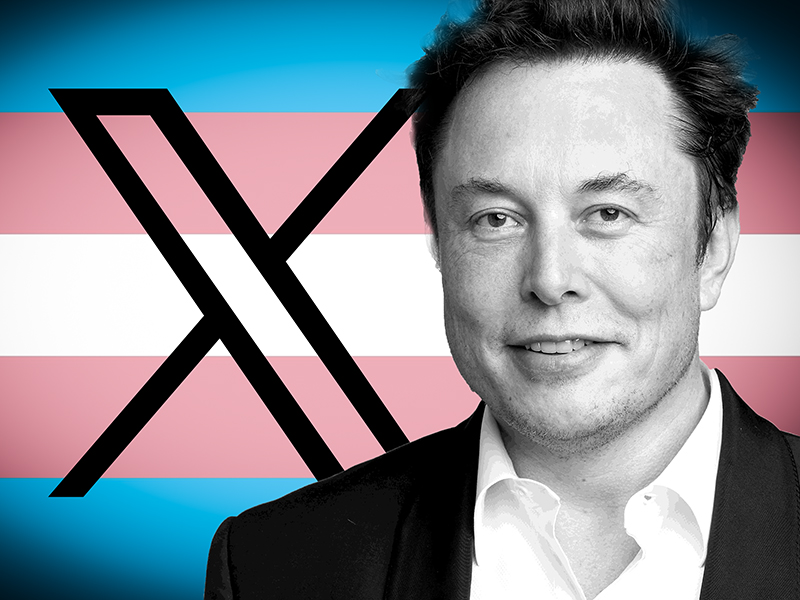

The social media platform X, formerly known as Twitter, quietly reinstated an anti-harassment policy that once forbade users from misgendering or deadnaming others.
However, it is unclear if the change will stay in place following comments from owner Elon Musk.
Musk, who has sought to portray himself as a proponent of “free speech,” removed the policy in April 2023, responding to users who complained after being banned for expressing anti-transgender sentiment.
In a recently updated section of the platform’s policies, the company says that, where required by local laws, the platform will reduce the visibility of posts that “purposefully use different pronouns to address someone other than what that person uses for themselves, or that use a previous name that someone no longer goes by as part of their transition.”
X’s updated policy also requires that those targeted by deadnaming or misgendering must contact the community to issue a complaint, whereupon the company will determine whether the policy was violated, reports Ars Technica.
X also has policies that could potentially be related to misgendering or deadnaming, such as a prohibition on the “malicious, unreciprocated targeting” of users in an effort to humiliate or degrade someone, including by tagging them repeatedly in posts with “malicious content” over a short period of time; and a prohibition on encouraging off-platform harassment or violence directed at specific individuals or groups of people.
Chaya Raichik, the person behind the Libs of TikTok account, took umbrage at the return of the misgendering ban, and sought to test it by misgendering three famous transgender individuals.
In response to that post, Musk wrote: “You’re not going to get suspended.”

In a subsequent exchange, Musk wrote that the policy only applies to “repeated, targeted harassment of a particular person.”

“Using the correct sex-based pronouns for someone is ‘harassment’?” Raichik responded. “We’re being forced to lie? What about harassment in general? There are accounts that repeatedly target and harass specific individuals in an obsessive way. What constitutes ‘repeated’ and ‘targeted’ and why do only one group of people get this special treatment?”
Another user later asked Musk, “Will you reverse the Pronoun policy on X because it will definitely lead to censorship on this platform?” He replied, “Looking into it,” suggesting that the policy may be repealed or reversed.
The update appears to have taken place around the same time that the LGBTQ media advocacy organization GLAAD issued a report on the misgendering and deadnaming of transgender individuals.
In that report, GLAAD urged major social media platforms to recognize those behaviors as forms of hate speech, noting that, of six top social media platforms — Facebook, Instagram, TikTok, Threats, YouTube, and X — “only TikTok explicitly prohibits misgendering and deadnaming in its hate and harassment policy.”
Other social media platforms have adopted prohibitions on targeting misgendering and deadnaming as part of their “hateful conduct” or anti-harassment policies, including Discord, Post, Tumblr, Pinterest, NextDoor, and Spoutible, according to GLAAD’s report.
The streaming platform Twitch also bans “intentionally referring to someone using a pronoun or form of address that does not correctly reflect the gender with which they identify, such as repeating incorrect pronouns after being asked to stop.”
While expressing a preference for policies that explicitly ban deadnaming and misgendering — thereby making it easier for moderators to intervene and remedy the situation — Jenni Colson, the senior director of social media safety at GLAAD, told Ars Technica that the shift toward adopting policies prohibiting such behavior is moving the needle in a positive direction.

“This is not about accidentally getting someone’s pronouns wrong,” Olson said. “That’s fine. That happens. This is about targeted misgendering and deadnaming with a clear intent of expressing hate and disrespect and contempt.”
It remains to be seen whether Musk — who has been criticized for expressing anti-transgender views and for the alleged proliferation of hate speech on X following his takeover of the company — will keep the recently revised policy on pronoun usage, and to what degree it can be enforced if it does remain in place.
According to an analysis by the Center for Countering Digital Hate, X has made millions of dollars in ad revenues from users who regularly spout anti-LGBTQ — and specifically anti-transgender — views.
But The New York Times claimed last year some of the more controversial content on the site, such as anti-Semitic conspiracy theories, had also led some big-name advertisers to either halt or consider pausing their ads on X over fear of being associated with such content.
X reportedly pushed back on that claim, saying, at the time, that the estimated potential losses in ad revenue reported by the Times were outdated.



